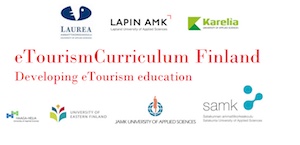Home » Future Technologies in Tourism
eTourismCurriculum
IMPLEMENTATION PLAN
| Code, name and number of ECTS of study unit |
MMTE1000 FUTURE TECHNOLOGIES IN TOURISM, 5 cu |
| Implementation | Virtual |
| Language of instruction | English |
| Virtuality Description
Scope (ECTS) |
Online course including online lessons, virtual collaboration and group work. Visiting lectures and presentations from the tourism and technology business and applicable study tours may applied. |
| Academic year | 2nd to 4th |
| Starting and ending dates | See https://www.etourismcurriculum.fi/etourismcurriculum-timetable/ |
| Teacher in charge, other teachers | Henna Siltanen |
| Objectives | This course focuses on novel and future digital services targeted to travelers. After the course student is aware of the trends of the technological applications in global tourism business and he/she understands the significant role of new technological innovations in the development of new product concepts in tourism business. Student has a broad understanding of the possibilities that new technologies offers to tourism and he/she is capable to design new application concepts based on the future technology. Student has a basic knowledge of design and innovation process of new technological applications in tourism business |
| Content |
|
| Prerequisites |
|
| Pedagogical arrangements | Course implementation includes self-paced elements, but also active online-discussion plays significant role. |
| Materials | To be defined in the beginning of the each course implementation |
| Assignments | Each student presents and evaluates a new technological, tourism business related/applicable innovation. The result of this work is presented in two format: with a project report and with a presentation. |
ASSESSMENT PLAN
| Code, name and number of ECTS of study unit | MMTE1000 FUTURE APPLICATIONS AND TRENDS OF TOURISM TECHNOLOGY, 5 cu |
| Teacher in charge and other teachers | TBA |
| Assessed parts and their share of total assessment | Active participation on all the learning tasks during the course is evaluated.
|
| Grading Scale | Excellent (5) – Satisfactory (1), Fail |
| General Assessment Criteria (taken from SoleOPS) | Excellent (5)- Student has an excellent command of theoretical knowledge and is able to apply it fully in practical learning exercises. Student participates lectures actively and shows analytical, reflective and critical approach in all his/her activities. All the assignments are performed according to instructions.Good (3-4) Student has a good command of theoretical knowledge and is able to apply it mostly in practical learning exercises. Student participates lectures quite actively and shows somewhat analytical, reflective and critical approach in most of his/her activities. All the assignments are performed mostly according to instructions.Satisfactory (1-2) Student has a satisfactory command of theoretical knowledge and is able to apply it only partly or not at all in practical learning exercises. Student participates lectures seldom and shows very little or no analytical, reflective and critical approach in his/her activities. The assignments are not fully performed according to instructions.Failed (0) Student has not participated the compulsory learning activities and has failed to perform one or more assignments according to instructions. |
| To be taken into account | Software for detecting plagiarism is used when returning assignments.Late assignments are assessed according to the schedule the teacher/teachers have given. Late returns affect negatively the assessment of the assignment.
Please note that there can be more specific assessment criteria for the whole study unit and/or learning assignments which will be given at the beginning of the study unit. |
